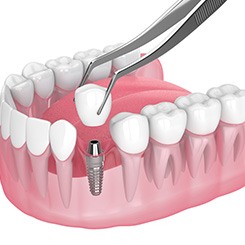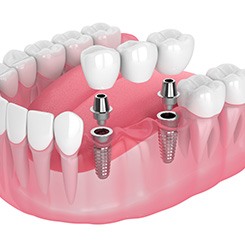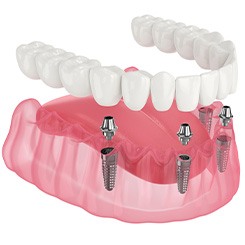Dental Implants – Rockville, MD
The Modern Way to Replace Teeth
Bridges and dentures have been used for a very long time to replace teeth, but despite the benefits they offer, they simply do nothing to make up for the loss of your natural tooth roots. Dental implants serve as artificial roots for various kinds of dental restorations, which make your new smile strong, stable, and long-lasting. Are you ready to have a complete and confident smile again? Call Rockville Family Dentistry today for a consultation to discuss tooth replacement with dental implants in Rockville, MD from Dr. Modarres.
Why Choose Rockville Family Dentistry for Dental Implants?
- Dental Implant Surgery Performed In-House
- Dental Team That Cares About Your Satisfaction
- Options for Making Dental Care More Affordable
What are Dental Implants?

Dental implants are thin screwlike posts made out of titanium. They have one key feature that differentiates them from traditional tooth replacements: they are designed to be inserted into the jaw so that they can fuse with the bone. This lets them effectively fulfill all of the functions of natural tooth roots, and they can be used to anchor a custom-made restoration into place. Rebuilding teeth from the roots up results in new ones that look, feel, and function as naturally as possible.
The 4-Step Dental Implant Process

The process of getting dental implants is personalized for every patient based on their needs. That said, it can generally be divided into four major steps: the initial consultation, the surgery, the osseointegration/abutment stage, and the placement of the final restoration. You can learn more about each of these steps below before you start your own journey toward a beautiful re-completed smile.
Initial Dental Implant Consultation

Are dental implants the best choice for replacing your missing teeth? Will you need to have any preliminary procedures performed before the implant posts can be inserted into your jaw? In order to figure out the answers to these questions, you need to schedule a consultation with our team.
We’ll carefully examine your mouth, evaluate the state of your jawbone and other relevant dental structures, and determine how many implant posts would be required to fill in all the empty space in your grin. Don’t be shy about asking us questions; we want you to feel like you fully understand what will happen during the dental implant process.
Dental Implant Surgery

After the consultation and the necessary preparations comes the dental implant surgery. Instead of sending you to an unfamiliar specialist, we can perform this procedure right here. When the surgery begins, your mouth will be numbed before the gums are opened. The implant posts will be inserted into precisely chosen spots before the gums are closed again. To protect the posts while your mouth is healing, special caps will be attached.
Dental Implant Osseointegration & Abutment

Dental implants are able to act as new tooth roots, but only after they have fused with the jawbone via osseointegration. This process does not happen overnight; it can take anywhere from 3 to 6 months.
After osseointegration, the time will come to receive your abutments, which will be placed via a second surgical procedure. The abutments are a critical part of the dental implant process because they will eventually be used to attach a crown, bridge, or denture to your implant posts.
Delivery of Dental Implant Restoration(s)

The exact type of restoration that your dental implants will support will vary from case to case:
- An implant-supported crown can replace one missing tooth.
- An implant-supported bridge can fill in the gap left by three or more consecutive missing teeth.
- An implant-supported denture allows you to replace all of your teeth at once when an entire arch is missing.
No matter what kind of prosthesis is needed, it will be expertly designed with the help of detailed impressions of your mouth. While a laboratory will create the restoration, we will personally handle the process of attaching it to your implant posts. Once this step is complete, you will be able to enjoy life with beautiful replacement teeth that look, feel, and function like the real thing.
Benefits of Dental Implants

Tooth loss can impact your daily quality of life because simple tasks like eating and speaking suddenly become much more challenging. Plus, it can impact your appearance which can leave you feeling so self-conscious that you avoid interacting with other people. If you’re looking for ways to rebuild your smile, why not consider dental implants?
These artificial teeth continue to gain popularity as the ideal way to replace your missing pearly whites because of the unique advantages they provide. They’re the only restoration that’s directly inserted into your jawbone which means they have unique benefits over the alternatives like dentures or dental bridges. Continue reading to learn more about how they can help you, and feel free to contact us if you’d like additional information.
Day-to-Day Benefits

Your teeth play an essential role in your ability to form certain words and to sufficiently mash your food to be swallowed and digested. When there are gaps in your grin, these tasks that were once second nature can be quite challenging. Fortunately, dental implants can increase the quality of your daily life because you can:
- Enjoy a full menu. Unlike dentures and dental bridges, dental implants function as a standalone structure in your mouth. That means they’re sturdier and there are fewer dietary restrictions to contend with. With them in place, you can once again enjoy all your favorite foods.
- Clean them easily. You won’t have to worry about removing your restoration periodically to clean it because it’s permanently embedded in your mouth. Caring for it is as simple as brushing and flossing twice daily.
- Feel more confident. When you don’t have to worry about your artificial teeth slipping or falling out of place, you’ll feel more self-assured in social situations.
Health Benefits

There are other advantages to restoring your smile with dental implants that may not be so immediately apparent. Some additional health benefits include:
- Prevent additional tooth loss. When you lose pearly whites, your body reabsorbs some of your jawbone mass that’s not needed to support them. Because dental implants are inserted into your jaw, they stimulate it whenever you bite down or chew. This keeps it healthy and prevents it from deteriorating to the point that it can’t support your teeth.
- Avoid dental problems. Because they don’t rely on a firm suction with your gum to remain in place like dentures or require that you remove enamel to fit properly like dental bridges, you’re less likely to develop oral issues like gum disease and tooth sensitivity.
- Eat a wholesome diet. Many essential vitamins and minerals are found in foods that are harder to chew like tough meats, fruits, and vegetables. Dental implants are strong enough to easily break these down so that you can properly digest important ingredients.
Long-Term Benefits

Dental implants also offer several advantages over time, such as:
- Durability. They can last 30+ years if cared for properly, which for many patients is the remainder of their lives.
- High chance of success. These prosthetic teeth have an incredibly high success rate of more than 95% even 10 years after they’re placed.
- Saving money. Although you may pay more initially for dental implants than the other options, they typically don’t require as many repairs or replacements. That means that in the long run, they can be more budget-friendly than the alternatives.
Who Dental Implants Can Help

One of the many reasons dental implants are so popular is because they can be used in many different situations in conjunction with a variety of restorations depending on how many teeth you’ve lost. In other words, they are quite versatile! If you are interested in rebuilding your smile with dental implants, then don’t hesitate to take the next step: schedule a consultation at our Rockville office. You’re also welcome to read on to learn more about who dental implants can help.
Who Is a Good Candidate for Dental Implants?

Before we can determine if you’re a good candidate for dental implants, we need to consider several factors, starting with the extent of your tooth loss, the density of your jawbone, and your commitment to good dental care practices. Additionally, you need to be in good oral health before implant surgery; if we find that you’re not currently a good candidate for the procedure, we can schedule preparatory treatments to address such issues so that implants can be placed successfully.
In short, if your smile is healthy, but you’re struggling with tooth loss, there’s a good chance that you’ll be a candidate for dental implants. Plus, if you aren’t initially, we’ll likely be able to provide the necessary restorative care beforehand to ensure a healthy, complete smile isn’t out of reach!
Missing One Tooth

Even a single gap that’s located where no one else can see it can pose severe oral health challenges given enough time. Plus, it can negatively impact your self-esteem, your speaking patterns, and your diet. Fortunately, an implant post topped with a crown can be placed into the gap in order to fully replace the missing tooth. Unlike a traditional bridge, an implant crown will not require the removal of any natural enamel from nearby teeth.
Missing Multiple Teeth

Traditionally, dental bridges are anchored in place with dental crowns, which are attached to natural teeth. If you are missing three or more teeth in an arch, then you’ll be happy to hear that they can also rest on dental implants, ensuring your healthy enamel doesn’t need to be altered in the process. Of course, if you are missing several teeth throughout your mouth, we can also anchor a partial denture in place with implants, restoring the look, health, and function of your smile in the process.
Missing All Teeth

If an entire arch of teeth is absent, a full denture may be required. While a traditional denture rests on the gums and is designed to be removable, an implant denture is anchored to a minimal number of implant posts and is typically fixed in place. Not only does this prevent unwanted slipping while you’re talking, laughing, and chewing, but it also adds to the longevity of your restoration. Plus, dental implants are the only tooth-replacement solution that stimulates your jawbone and preserves your face shape!
Understanding the Cost of Dental Implants

When people see the cost of dental implants, they can often be a little bit intimidated about paying for their dental care. You should know that dental implants are absolutely a case of “you get what you pay for;” then money that you spend will translate to an incredible new tooth.
We also make every effort ensure that the care that you’re getting from us is going to be affordable, and that paying for your services will be easy. We’ll give you a complete estimate for the price of your services when we meet you in person, but here’s what you should know before then about what dental implants usually cost.
Preliminary Treatments & Dental Implant Surgery

One thing you might have to consider when budgeting for your dental implant surgery are the preliminary treatments you might need before you actually get your new tooth. If your oral health is sub-par, you might need gum disease therapy, tooth extractions, or bone grafts in order to ensure that your dental implant will have a solid foundation. Thankfully, many of these procedures will be at least partially covered by dental insurance.
Then there’s the cost of the surgery itself. We complete dental implant placement in-house, which means we should be able to give you a complete estimate for what the procedures and sedatives will cost you before the procedure.
The Parts of Your Dental Implant

The price of your dental implant itself is also important to consider. Naturally, the number of dental implants and the restoration that you’re putting on them will influence what you’ll pay overall, but that’s far from the only thing you’ll have to consider.
Some dental implants will also be longer or shorter depending on several factors and can be made of several different kinds of materials. This influences what your dental implant is going to cost you. There are also different brands who make dental implants, each of which comes at a different price point.
We’ll talk to you in detail about how each of these factors are going to influence the cost of your implant when we meet you in person.
How Dental Implants Can Save You Money

Due to the relatively high upfront cost of the procedure, patients are often tempted to pursue options other than dental implants, like dentures or dental bridges. However, in the long run, dental implants tend to be the most cost-effective method of replacing teeth.
This has to do with their incredible longevity. Dentures and dental bridges tend to last around five to ten years before needing to be replaced, while dental implants routinely endure for around 30! Many dental implants even last a lifetime if they’re cared for well.
Dental implants also prevent jawbone degradation and tend to be easier to clean than other methods of tooth replacement. This puts you at much lower risk of developing expensive oral health problems down the line. This being the case, you can generally expect your dental implants to save you a lot of money in the long run.
Does My Dental Insurance Cover Dental Implants?

For a long time, dental implants weren’t really covered by dental insurance companies. This is still the case for many of them, but it’s also something that is very rapidly changing. For that reason, we will help you consult with your dental insurance company to make sure that you’re getting the most out of your benefits.
Making Dental Implants Affordable

If you don’t have insurance, or if yours won’t cover the cost of your implants, we still want to make your dental implants as affordable as possible. For one, we offer a free dental implant consultation for our patients, which means that you have nothing to lose if you want to learn more about the treatment.
We also frequently work with CareCredit, which is a financing firm that can make your dental implants much more budget friendly. Patients who qualify can split the cost of your dental treatment across several months, often with low-to-no additional interest.
If you want to learn more about the cost of your dental implants, give us a call and we’ll be happy to see you for a free consultation.
The Importance of Bone & Bone Grafting

Dental implant placement relies on there being enough bone in the jaw to support the posts. However, losing teeth tends to lead to the jawbone breaking down, which means that oftentimes bone grafts have to be done before we can perform implant surgery. The tissue used to rebuild and strengthen the jaw is typically taken from elsewhere in your body, although it can also be provided by a donor if needed.
Maintaining & Caring for Your Dental Implants

Dental implants are very easy to care for. In fact, many of the most important steps for maintaining them are things that you likely already do for your natural teeth. If you’re ever unsure that you’re giving your dental implants the right kind of care, feel free to ask our team for advice. Meanwhile, here are the basics that all patients should follow to keep their dental implants as safe as possible.
Make Oral Hygiene a Priority

When you’re first told that you need to give your dental implants the same attention as your teeth while brushing, you may wonder what the point is. After all, your implants can’t get cavities, can they? While it’s true that tooth decay won’t be an issue for the implant posts, you still have to watch out for gum disease. If the tissue around the implants becomes inflamed due to plaque buildup, it could lead to serious issues such as implant failure. Remember to brush and floss every day to keep your re-completed smile in great shape.
Eat a Healthy Diet

Foods that contain a lot of sugar or starch will cause the bacteria in your mouth to produce more acid, leading to gum disease and other oral health issues. For the sake of your dental implants as well as your entire mouth, you should maintain a balanced, healthy diet. Avoid sugar and starch as much as possible while making sure you get plenty of fruits, vegetables, dairy products, and whole grains. Don’t forget to drink plenty of water as well to help keep your smile clean.
Break Bad Habits

Maybe you sometimes chew on your fingernails or the end of your pen without thinking about it. Or you might find yourself using your teeth to get into a particularly troublesome package. These kinds of habits are bad for your dental implants, and if they’re left unchecked, they could do serious damage. Make a list of any bad oral habits you may have picked up and consider strategies that can help you break them, such as keeping sugar-free gum on hand for when you feel the urge to chew something.
Protect Your Dental Implants

Do you play football, soccer, basketball, or any other kind of contact sport? These activities carry a risk of damaging your dental implants and your teeth if you happen to get hit in the mouth. Wearing a mouthguard helps keep your entire smile safe. A similar oral appliance known as a nightguard may be recommended if you’re prone to bruxism (involuntary teeth grinding that often occurs at night).
Schedule Regular Dental Checkups

Are your dental implants still in good shape? It can be hard to tell on your own, but our team can check for problems the next time you visit our office for a dental checkup and cleaning. It’s generally recommended that you schedule a dental appointment at least twice a year; these biannual visits will give us the opportunity to make sure that your dental implants are getting the care they need.
Dental Implant Post-Op Instructions

Once your dental implant surgery is complete, it’s time to focus on healing. Following the right post-op care will help ensure a smooth recovery and the long-term success of your implants. At Rockville Family Dentistry, we want to make your healing process as comfortable as possible, so we’ve compiled a wealth of excellent advice below. By following these simple guidelines, you’ll protect your new implant, reduce discomfort, and get back to your routine faster.
What to Do Directly After Dental Implant Surgery

The first 24 hours after surgery are critical for your recovery and the ultimate success of your implant. Follow these steps to promote healing and start your recovery off right:
- Rest & Elevate: Take it easy and keep your head slightly elevated to minimize swelling.
- Manage Bleeding: Bite gently on gauze for 30–60 minutes to control bleeding, replacing as needed.
- Use Ice Packs: Apply an ice pack to the outside of your cheek in 15-minute intervals to reduce swelling.
- Avoid Disturbing the Area: Don’t touch the implant site with your tongue, fingers, or toothbrush for the first day.
- Skip Straws, Smoking & Vaping: Suction can dislodge the healing clot, leading to complications.
Common Side-Effects When Recovering from Dental Implant Placement

After your implant placement, some post-surgical symptoms are completely normal and should fade within a few days. Here’s what to watch for:
- Mild Swelling: You may see some slight swelling around the implant site, but it generally peaks around day two or three before gradually improving.
- Soreness or Discomfort: Most discomfort associated with implant surgery is easily managed with prescribed or over-the-counter pain relievers.
- Light Bleeding: Slight seepage is normal but should stop after the first 24 hours.
If you notice excessive pain, bleeding, or signs of infection, contact our Rockville office as soon as possible. We’ll examine your implant site and put things back in order.
Your Diet After Dental Implant Surgery

For the first few days, it’s best to plan a menu of soft foods that won’t put pressure on your implant. Here are some great options that combine softness with excellent nutrition:
- Smoothies, yogurt, applesauce
- Mashed potatoes, scrambled eggs, soft pasta
- Soup (warm, not hot) and protein shakes
Avoid crunchy, hard, or sticky foods until Dr. Shahram gives you a green light. Staying hydrated is also important. Just remember—no straws!
Post-Op Health & Oral Hygiene

Good oral hygiene helps prevent infection and promotes healing. Follow these tips for a fresh, healthy smile that will help increase your implant’s chance of success:
- Rinse Gently: After 24 hours, rinse with warm saltwater 2–3 times a day, carefully swishing and letting the water fall from your mouth instead of spitting.
- Brush Carefully: Avoid the surgical site for the first few days, but keep brushing and flossing other teeth.
- No Mouthwash: Alcohol-based rinses can irritate healing tissues.
What to Do After Your New Teeth Are Attached

Once your permanent crown, bridge, or denture is secured, it’s time to enjoy your new smile! Feel free to celebrate by eating and drinking whatever you want. However, keep in mind that your implant will need care to stay healthy, just like your other teeth.
- Maintain a solid oral hygiene routine, including brushing and flossing daily.
- Visit us for regular checkups to monitor your implant’s health.
- Avoid using your implant to bite extremely hard foods, like ice or hard candy.
With proper care, your dental implant can last a lifetime! If you have any questions or concerns, don’t hesitate to reach out to our Rockville dental office. We’ll be happy to hear from you.
Dental Implant Failure & Salvage

Even though dental implants have an extraordinary success rate of over 95%, there are some instances where they might fail, which in turn can threaten your dental health. When this happens, it’s best to address the situation quickly before matters are made worse. Our experienced team can help with various dental implant failure and salvage treatments – as soon as you suspect that there’s a problem with your implant, get in touch with us right away!
Learn More About Dental Implant Failure & Salvage
Dental Implant FAQs
How Long Do Dental Implants Last?
Dental implants can last for over 30 years with proper care, allowing you to enjoy them for potentially the rest of your life. Their lifespan will directly depend on your health and lifestyle. It’s important that you maintain daily brushing and flossing, brushing twice a day for two minutes each session and flossing once a day. It’s also vital to visit our office regularly for checkups. During these appointments, we will examine your smile and ensure that your dental implants are in good health. Keep in mind that poor lifestyle habits like tobacco use can shorten the lifespan of your implants, which is why you should quit smoking if you do.
Can I Take Dental Implants Out?
No – dental implants are surgically placed in the jawbone, which is why they can only be removed by a professional. Implants are made of biocompatible materials that fuse to the jawbone, allowing them to become a permanent part of the body during a process called osseointegration. However, some implant dentures are designed so the denture can be removed, snapping them in and out. In this example, the dental implants themselves stay in the jawbone because they are acting as artificial tooth roots.
Does Getting Dental Implants Hurt?
Many patients find out that dental implants require surgery and automatically assume that it’s painful. However, your implant dentist in Rockville will always ensure that your mouth is completely numb before beginning the procedure. Sedation is also offered, giving you a deeper sense of calm and relaxation. As a bonus, the jawbone doesn’t contain very many pain-sensing nerves, which makes the surgery much more comfortable than you may have guessed. The procedure itself is painless but there will be some slight soreness after the fact. This can be managed by following your post-op instructions carefully, which will usually include pain medication.
How Successful Are Dental Implants?
Dental implants come with a success rate of 95% even after 10 years, making them an incredibly predictable and reliable option. The success of your implants will depend on a few factors, including how well you take care of them, how often you visit your dentist, the diet you consume, and your lifestyle choices. Additionally, the location of your dental implants can also influence their success rate. Implants that replace molars often receive more pressure and wear compared to the front teeth because you use them to chew. This can make them slightly more likely to fail.
Am I Too Young to Get Dental Implants?
Whether you’re “too young” for dental implants will depend on your age. In particular, it’s based on your closeness to adulthood.
The truth is that only adults can receive dental implants. A person’s jaw doesn’t fully develop until young adulthood, so placing the posts before then is risky. The latter process can disrupt bone growth and result in serious health concerns, thus lowering your quality of life.
Given these facts, most dentists don’t place implants in patients under 18. They’ll wait until a patient is in their early to mid-20s before they consider treatment.
Do Dental Implants Feel Natural?
As a matter of fact, yes – dental implants generally feel natural. Most patients view them as exactly like the original teeth, especially once the prosthetics are secure and stable.
Note that dental implants don’t have their own nerve endings. They can’t “feel” things in general, let alone unnatural or uncomfortable. Any sensations near them – heat, cold, pressure, etc. – will only come from the adjacent gum tissue, not the posts themselves.
Furthermore, dental implants are capped with smooth porcelain. This material feels like enamel when touched, whether by your fingers or your tongue. It won’t cause odd or unpleasant sensations.
How Long Does a Dental Implant Procedure Take?
How long the implant process takes will depend on how many implants you need. Indeed, the final number of posts can affect whether treatment is relatively fast or slow.
For perspective, placing a single implant usually takes an hour or two. This time allows the dentist to administer anesthesia, dress you for a sterile atmosphere, and set the actual post. Adding extra implants will only make the appointment longer, extending it by hours or even days.
In light of this reality, make sure to adjust your schedule properly. You wouldn’t want your surgery to overlap with some other obligation.
Do Dental Implants Make You Look Younger?
Dental implants really can make you look younger. Still, this effect depends on your age, the severity of your tooth loss, and the state of your jaw.
Consider a middle-aged adult with missing teeth, for example. Tooth loss will have eroded this person’s jaw a bit, causing their face to look wrinkly and sunken. Even so, dental implants could stimulate their jawbone to prevent and reverse such atrophy. The result would be a face that looks firmer, fuller, and younger.

